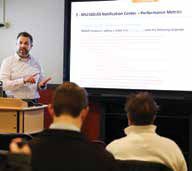AS THE SPEED of technology grows, so does the ability to easily submit locate requests. This, in combination with accessibility via mobile devices, results in the growth of ticket volumes year after year. Excavators have the responsibility to comply with One Call laws and dig safely while facility operators are challenged with responding to tickets quickly and accurately. The demand to thoroughly facilitate locate requests affects everyone from the One Call center to the locate technician in the field. For everyone to comply with state regulation while improving public safety, each state should periodically review One Call laws to identify areas of improvement.
As 2020 legislative sessions approach for states across the nation, stakeholders in Minnesota have already begun conversations to improve the state’s One Call Law — Minnesota State Statute 216D (MS216D). The Minnesota Office of Pipeline Safety (MNOPS) is currently facilitating review meetings to bring stakeholders in the damage prevention industry to the table and work together to improve Minnesota’s One Call Law. Stakeholders in the excavation, facility (utility) operator, One Call center, locate, engineer/survey, and municipal industries met the week of Nov. 18, 2019, to engage in effective communications. Stakeholders met again the week of Jan. 13, 2020.
During these meetings, MNOPS listened to feedback and continued to improve the proposed statutory language that was initially submitted for legislative review in October 2019. While not every stakeholder shares the same view on each proposed language change, it is important everyone has an opportunity to share their own experience and offer solutions for improving state laws.

Jon Wolfgram, chief engineer of the MN Office of Pipeline Safety, conducting one of the MS216D meetings.
Anyone who has been involved with legislation understands the amount of time and effort it takes to ensure conversations are constructive and meaningful. The key element in improving One Call laws is working together as a unified voice. This involves sharing ideas, supporting viewpoints with metrics and data, and keeping in mind how our work affects public safety. In doing so, we in Minnesota, and other states, will be able to hold ourselves accountable for the betterment of public safety.
To view the proposed Minnesota One Call Law changes, visit dps.mn.gov/divisions/ops/forms-documents/Documents/MS216D_12-18-2019%20proposed%20language%20revisions.pdf. To view current Minnesota One Call Laws, visit revisor.mn.gov/statutes/cite/216D for state statutes (MS216D) and revisor.mn.gov/rules/7560/ for rules (MN rules 7560).
Comments